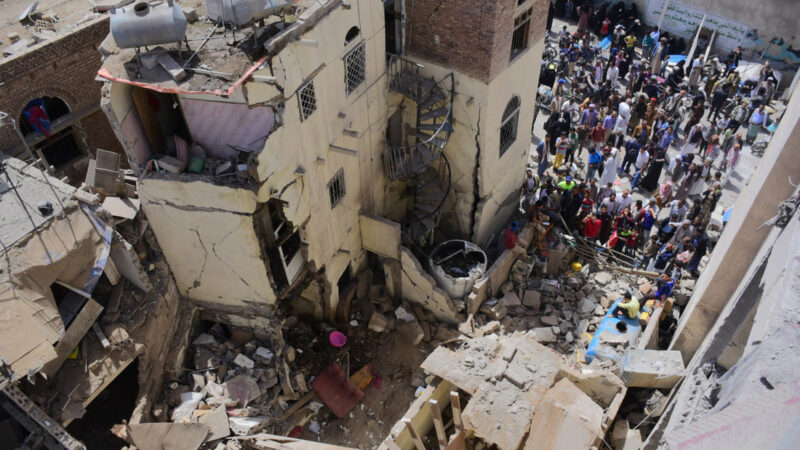Benali Hamdache writes on how the complexity of the war has allowed the UK government to get away with not using its power to bring peace, and to continue profiting from arm sales.

Benali Hamdache is Green Party migration and refugee support spokesperson
Today is the 7th anniversary of the forgotten war. One of the biggest humanitarian crises in the world right now. The war in Yemen is both devastating and under-reported.
Since this war started 377,000 Yemenis have died of disease, hunger or conflict. 12 million children are in danger and need aid to make it through the year. The reality of life for civilians is harrowing, but the inertia and inaction from decision makers is evident and widespread.
This is despite our colonial legacy and historical ties to Yemen. South Yemen was made part of the British Empire and the British Yemeni community is both the largest and longest lasting Arabic community in the UK. Yemeni steelworkers and sailors helped build this country. But their story is not well known, and our government seems to hold little regard for repairing our legacy in the region.
Seven years ago, war broke out in Yemen. Modern day Yemen is made up of the former British colony that constituted South Yemen and the former Ottoman colony of North Yemen. The two countries came together in an uneasy and difficult union after wars and political collapse in the 70s and 80s. Yemen has been one country since 1990, but the history of being two nations has caused strife, conflict and paralysis.
Civil war and instability for three decades
Yemen’s history is also filled with the consequence of decisions by other powers. In 1990 Yemen declined to join the Gulf War’s coalition forces. Saudi Arabia responded by evicting hundreds of thousands of Yemeni workers, closing off much needed remittances. The decision seriously destabilised the economy of this newly formed nation. From that point, civil war and political instability dominated the next three decades.
Religious differences have also caused much strife. Yemen’s Shia community mostly live in the North, whilst the Sunni community live in the South. Policies on religious minorities and representation have fed into the conflict and have made finding peace much harder. This has only been exacerbated by the war becoming a proxy war between Iran and Saudi Arabia, both seeking to boost the fortunes of their allies. The result is a runaway war with peace seeming remote. This complexity has allowed the UK government to get away with not using its power to bring peace and to continue profiting from arm sales.
Businesses making billions selling deadly arms to use in Yemen
Today businesses like BAE systems are making millions, selling deadly arms to Gulf States to use in Yemen. Yemen is trapped in a cycle of British bombs dropped by one side, with Iranian arms killing more in return.
But there are many more things Liz Truss could be doing as Foreign Secretary. The UK has been shamefully quiet over war crimes committed by our Gulf state allies. We’ve not used our powers at the UN to call for accountability of war crimes, when Dominic Raab was so fast to do the same over Russia in Ukraine. We could be doing much more to reign in our allies and put a negotiated settlement and a ceasefire first.
The struggles of British Yemeni
The dichotomy in the difference in response to Ukraine versus Yemen is one noticed loudly by the British Yemeni community. They cannot bring loved ones to safety in this country. They struggle to send money to family in need. They see little action from their government as an honest broker for peace. Progressive voices need to be shifting the Overton Window and calling for equal treatment of refugees and victims of war, regardless of skin colour.
We need a cross party movement to call this out and demand more. The right for family reunification for British Yemenis and refugee sponsorship should be established. For Syrians, Afghans and many others from the Global South too. Our refugee policy shouldn’t make distinctions based on faith or ethnicity.
The rapidness of Russian sanctions and political action show that the government has many more tools at its disposal. Many more than it is willing to use for conflicts elsewhere, even if at times it’s had to be shamed into using them. We have to use this political precedent to demand more action for Yemen. Starting with stopping selling arms to the conflict and continuing with real accountability for war crimes. This war will not be solved by the one sided approach taken. It needs honest brokers.
Wealthy nations’ money can save lives
Finally, this government’s cut of the international aid budget remains one of its most shameful decisions. The world is increasingly more complex and unstable and will be more as the climate emergency worsens. Wealthy nations’ money can save lives. Instead, less money will be spread between more conflicts, with the very real consequence of the most vulnerable dying.
Let’s not forget either the shameful Nationality and Borders Bill. Its passage will shut the door to Yemenis in need. It will punish any who manage to reach family here.
Conservative foreign policy and refugee policy is often portrayed as “common-sense”. But if the status quo is endless war, barbarity and suffering it needs a radical fresh start. Progressives shouldn’t be afraid to call out an establishment that is complacent, lazy and dominated by self-interest. Black and brown lives matter.
To reach hundreds of thousands of new readers we need to grow our donor base substantially.
That's why in 2024, we are seeking to generate 150 additional regular donors to support Left Foot Forward's work.
We still need another 117 people to donate to hit the target. You can help. Donate today.



